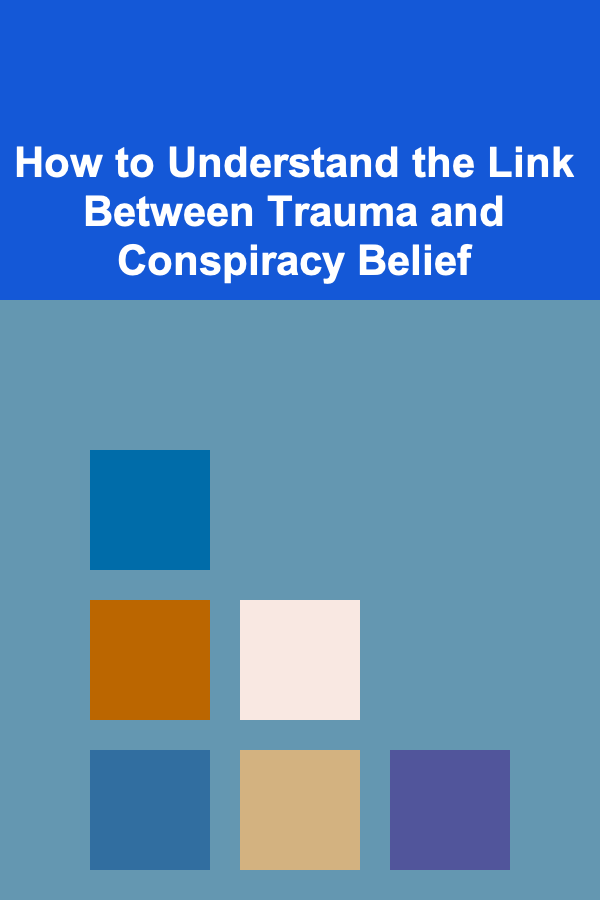
How to Understand the Link Between Trauma and Conspiracy Belief
ebook include PDF & Audio bundle (Micro Guide)
$12.99$5.99
Limited Time Offer! Order within the next:

In the complex world of human psychology and belief systems, the link between trauma and conspiracy belief is a critical yet often overlooked subject. The past two decades have seen an explosion of conspiracy theories, fueled by digital media, social platforms, and shifting societal norms. These theories can range from the seemingly benign (e.g., belief in the "Mandela Effect") to the profoundly dangerous (e.g., beliefs that promote violence, such as QAnon). However, less understood is how trauma---whether psychological, emotional, or physical---can lead individuals down the path of believing in these theories.
The connection between trauma and conspiracy belief is a nuanced one, often tangled with cognitive biases, social influences, and psychological coping mechanisms. This article delves deeply into this relationship, exploring the mechanisms behind trauma, the psychology of conspiracy beliefs, and the ways in which these two phenomena intersect.
Understanding Trauma: Types and Impacts
Trauma is an emotional response to an event that is deeply distressing or disturbing. This could be a single event or a series of events that significantly affect an individual's sense of safety, self-worth, and worldview. Trauma can manifest in many ways, from post-traumatic stress disorder (PTSD) to complex trauma that occurs over time. To understand how trauma influences conspiracy belief, it's crucial to first understand the types and impacts of trauma.
1. Types of Trauma
- Physical Trauma: Injuries to the body that can result from accidents, violence, or disasters. The psychological impact of physical trauma can range from fear and anxiety to disillusionment with the world.
- Emotional Trauma: Events that cause significant emotional pain, such as abandonment, betrayal, or the loss of a loved one. Emotional trauma often leads to deep feelings of vulnerability, mistrust, and helplessness.
- Psychological Trauma: The long-term effects of distressing experiences, including childhood abuse, emotional neglect, or exposure to violence. This type of trauma often leads to persistent negative beliefs about oneself or others.
- Collective Trauma: Trauma experienced by a community or society, such as in the aftermath of war, natural disasters, or social upheaval. Individuals within a traumatized collective may develop shared conspiracy beliefs as a way to explain their collective suffering.
2. Impacts of Trauma
The impact of trauma on individuals can vary widely, but some common psychological outcomes include:
- Hypervigilance and Anxiety: Trauma often causes individuals to become overly alert or paranoid, making them more susceptible to accepting explanations for events that feel threatening or incomprehensible.
- Distrust of Authority: Many trauma survivors develop a deep distrust of those in power. They may feel betrayed by institutions (e.g., government, healthcare systems), which opens them up to alternative explanations and theories that question mainstream narratives.
- Sense of Powerlessness: Individuals who have experienced trauma often feel helpless or out of control in their own lives. Conspiracy beliefs offer a sense of agency, suggesting that powerful forces are at play and that the individual may be able to uncover the truth and regain control.
The Psychology of Conspiracy Beliefs
Conspiracy beliefs are defined as the belief in secret, malevolent forces that are said to operate in the background of major world events. These beliefs offer simple explanations for complex or disturbing occurrences and often give individuals a sense of understanding or agency in a world that can otherwise feel unpredictable and chaotic. But what makes someone more likely to believe in conspiracies? Several psychological factors play a role:
1. Cognitive Biases
- Confirmation Bias: People tend to seek information that confirms their pre-existing beliefs while ignoring information that contradicts them. This bias can reinforce conspiracy beliefs, as individuals selectively attend to information that supports the idea of a hidden, malevolent agenda.
- Illusory Pattern Perception: Humans are wired to see patterns, even where none exist. This can lead to the belief that major events are the result of deliberate and coordinated efforts by powerful forces, even when the events are unrelated or accidental.
- Need for Uniqueness: Believing in conspiracies can provide a sense of uniqueness or special knowledge. This is particularly attractive to individuals who feel marginalized or powerless. It offers a way to feel different from the "sheeple" or the masses who are perceived as gullible.
2. Social Influences
- Group Identity and Belonging: Conspiracy beliefs can form strong social bonds. People who hold similar beliefs often create tight-knit communities where they can support one another and reinforce their views. These communities may even adopt an "us versus them" mentality, further entrenching individuals in their conspiracy theories.
- Social Validation: The more a person is exposed to conspiracy beliefs through friends, social media, or online forums, the more likely they are to accept them. This is particularly evident in the age of social media, where algorithms are designed to promote content that resonates with users' existing views.
3. Emotional and Psychological Needs
- Need for Certainty: Conspiracy theories often offer a clear and coherent explanation for complex or ambiguous events. This can be particularly comforting for people experiencing anxiety or uncertainty due to trauma. These theories offer a way to make sense of a chaotic world and provide a narrative in which the individual has a role.
- Control and Empowerment: Conspiracy beliefs can give individuals a sense of control, especially if they feel powerless due to their traumatic experiences. Believing that they are "in the know" about hidden truths gives them a sense of power and autonomy, even if it is illusory.
The Intersection of Trauma and Conspiracy Belief
Now that we understand the nature of trauma and the psychology of conspiracy beliefs, we can explore how these two elements interact to create a fertile ground for the acceptance of conspiracy theories. Trauma can amplify many of the psychological and emotional vulnerabilities that make individuals more susceptible to conspiracy beliefs. Let's explore the specific ways in which trauma may fuel these beliefs.
1. Trauma and the Need for Meaning
One of the most significant impacts of trauma is its ability to disrupt an individual's sense of meaning or understanding of the world. Traumatic events can shatter an individual's worldview, leaving them with feelings of confusion and uncertainty. Conspiracy theories provide a way to restore meaning. They offer a narrative in which everything happens for a reason, even if that reason is malevolent or hidden.
For example, individuals who have experienced significant losses (such as the death of a loved one) may be drawn to conspiracy theories that explain the event in terms of hidden agendas or secret plots. These beliefs provide a way of making sense of a seemingly random or senseless tragedy.
2. Trauma and Hypervigilance
Individuals who have experienced trauma often become hypervigilant, constantly on the lookout for threats, both real and imagined. This heightened state of awareness can make them more prone to perceiving "hidden dangers" in the world around them. Conspiracy theories, with their focus on secretive and malevolent forces, can appeal to this heightened sense of threat.
For instance, someone who has been a victim of abuse may be more likely to believe in conspiracy theories that suggest powerful elites are secretly controlling or manipulating society. The trauma they've experienced has heightened their sense of vulnerability, and these conspiracy theories offer an explanation for why the world feels unsafe.
3. Trauma and Distrust of Institutions
A significant number of conspiracy theories revolve around the idea that powerful institutions (e.g., governments, corporations, or the media) are secretly working against the public. This belief is particularly appealing to those who have experienced betrayal or abandonment by institutions that were supposed to protect or care for them.
Trauma survivors who have been failed by institutions, such as the healthcare system or the justice system, may be more likely to distrust authority figures. This distrust can create fertile ground for conspiracy beliefs, which suggest that those in power are actively working against the public's best interests.
4. Trauma and Emotional Regulation
Trauma often disrupts an individual's ability to regulate their emotions. Conspiracy theories can provide an emotionally charged outlet for processing these feelings. For some, believing in a conspiracy theory allows them to externalize their anger, fear, or frustration toward a faceless enemy, rather than confronting the complex emotions related to their trauma.
Moreover, the emotional validation offered by conspiracy communities (e.g., through social media or forums) can provide individuals with a sense of belonging and understanding. This is particularly important for trauma survivors who may feel isolated or misunderstood by others.
Conclusion
The link between trauma and conspiracy belief is a multifaceted issue that requires a deep understanding of human psychology, social dynamics, and the emotional and cognitive impacts of trauma. While conspiracy theories can be alluring in their simplicity, they often offer false assurances and explanations that prey on individuals' vulnerabilities. For trauma survivors, conspiracy beliefs may offer a sense of control, meaning, and empowerment in a world that feels chaotic and threatening.
It is important to recognize that not all individuals who experience trauma will develop conspiracy beliefs, but understanding the relationship between the two can provide crucial insights into the dynamics of belief formation and the role of psychological distress in shaping perceptions of reality. As society continues to grapple with the rise of conspiracy theories, understanding the deep-seated psychological mechanisms that drive belief is a key step toward addressing their impact on individuals and communities.
By offering compassion, support, and a more nuanced approach to addressing trauma, we can begin to dismantle the psychological barriers that allow conspiracy beliefs to take root and thrive.
Reading More From Our Other Websites
- [Organization Tip 101] How to Store Craft Supplies in Your Dining Room Creatively
- [Personal Financial Planning 101] How to Invest an Inheritance Wisely: Building Long-Term Wealth and Securing Your Future
- [Home Staging 101] How to Stage a Home When You Have Limited Furniture and Decor
- [Organization Tip 101] How to Use Color-Coded Bins for Family Bathroom Organization
- [Home Staging 101] How to Stage a Small Home for Maximum Space and Functionality
- [Whitewater Rafting Tip 101] Your First White-Water Adventure: A Step-by-Step Guide to Rafting
- [Home Space Saving 101] How to Organize a Slimline Wardrobe for a Cohesive Closet Layout
- [Personal Care Tips 101] How to Choose the Best Scented Dry Shampoo for Your Hair
- [Reading Habit Tip 101] Overcoming Reader's Block: Techniques to Keep the Pages Turning
- [Small Business 101] How to Use QuickBooks for Small Business: A Step-by-Step Guide

How to Create a Home Inventory Binder for Easy Reference
Read More
How To Grasp the Concept of Free Will vs. Determinism
Read More
How to Make Money Online as a Data Scientist: 10 Actionable Ideas
Read More
How to Sell Homemade Baked Goods and Start a Bakery Business from Home
Read More
How to Use Soundproof Curtains for Maximum Noise Reduction
Read More
How to Work with Hotels, Resorts, and Destinations as a Travel Photographer
Read MoreOther Products

How to Create a Home Inventory Binder for Easy Reference
Read More
How To Grasp the Concept of Free Will vs. Determinism
Read More
How to Make Money Online as a Data Scientist: 10 Actionable Ideas
Read More
How to Sell Homemade Baked Goods and Start a Bakery Business from Home
Read More
How to Use Soundproof Curtains for Maximum Noise Reduction
Read More